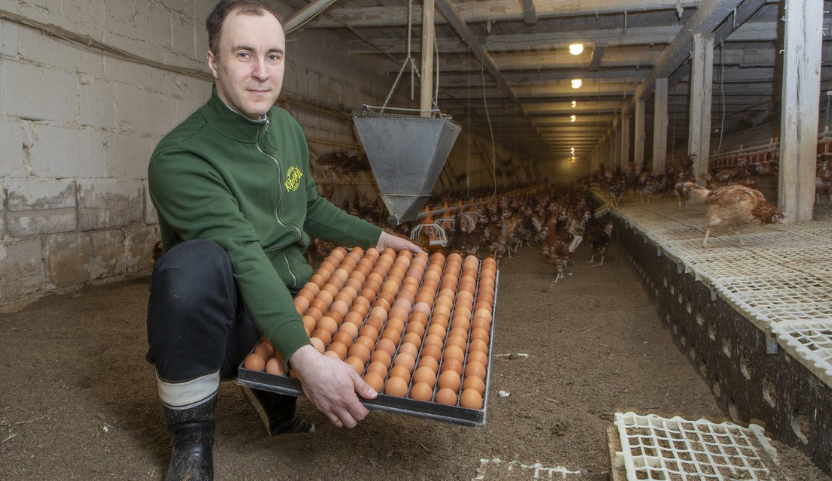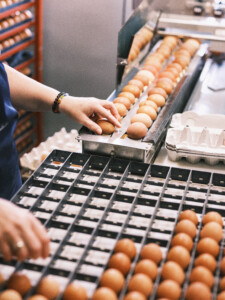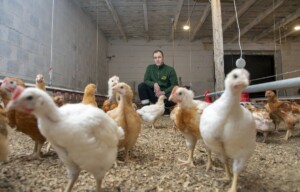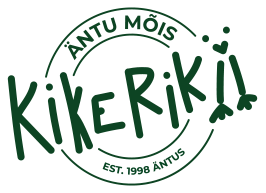Estonia’s largest organic egg producer: The price of organic eggs should be even higher
May 26, 2023

“If we want our very own food production and food industry in Estonia to continue, we should also support it more as consumers,” says organic producer Lauri Bobrovski, manager of Äntu Manor Henhouse in the rural municipality of Väike-Maarja.
The largest organic henhouse in Estonia, built on the Pandivere Upland in Lääne-Viru County, produces more than 7,000 organic eggs per day and three million per year, which represents just under one percent of Estonia’s total consumption. Half of the eggs on our tables come from abroad.
“Our chickens are of the Lohmann Brown breed who lay brown eggs,” said Lauri Bobrovski, the owner of private limited company Äntu Mõis OÜ, the largest producer of organic eggs in Estonia. In the heart of the former knight manor, chickens live in henhouses from the time of collective farms and in auxiliary buildings. There are five henhouses with 15,000 birds and a total of 13 employees. Easter increases sales significantly, and with the arrival of spring, young poultry become increasingly popular, as getting chickens for the summer is quite common in Estonia. “For the holidays, of course, people buy more eggs, but we have brown ones, so people still prefer painting white eggs,” said Lauri Bobrovski.
 At first glance, egg production seems like a simple business: feed the chickens grains and they keep on laying eggs. Actually, it is a laborious and low-profit business, which is also occasionally threatened by outbreaks of avian influenza. A week ago, the Agriculture and Food Board warned that the avian influenza virus, which is killing European laughing gulls, is once again threatening Estonia. Thousands of infected wild birds have already been identified in France, Belgium, the Netherlands, Austria, Switzerland and Italy. Last autumn, more than 49 million poultry were slaughtered in the USA due to the largest outbreak of bird flu. Poultry were also killed in Germany, the Netherlands, and France because of bird flu. This has led to rising prices for both chicken eggs and poultry meat in the European Union. Increased energy and production costs have also contributed to the price growth. Thus, the domestic supply of chicken eggs in Estonia is currently only 51%, i.e. 159 million eggs per year, but more than 300 million were consumed last year. Almost half of the eggs are thus imported from Latvia, Lithuania and Poland. 20 years ago, the domestic egg supply was more than 90%. Lauri bought the company from its former owner five years ago. An aid for a start-up farmer and a loan from the Rural Development Foundation helped a lot. “At first, the situation was quite hopeless, the company was in a really bad state, on the verge of liquidation, and many debts had not been paid,” Bobrovski recalled. The former collective farm henhouses were renovated, feeding technology was modernized, large wood-burning boilers were replaced with pellet heating, and production facilities were insulated. Instead of only nesting boxes, an automatic egg line was installed, where the eggs laid in the boxes fall on the line and move from there to the old cattle kitchen, where the eggs are lifted onto grates and taken to packaging. “We have only organic chickens, they need to have more square meters on the farm so that they can roam more freely, in addition, they can get more expensive organic feed,” Bobrovski said. Outside, too, the outdoor area for organic chickens is much more spacious than the yard for ordinary birds.
At first glance, egg production seems like a simple business: feed the chickens grains and they keep on laying eggs. Actually, it is a laborious and low-profit business, which is also occasionally threatened by outbreaks of avian influenza. A week ago, the Agriculture and Food Board warned that the avian influenza virus, which is killing European laughing gulls, is once again threatening Estonia. Thousands of infected wild birds have already been identified in France, Belgium, the Netherlands, Austria, Switzerland and Italy. Last autumn, more than 49 million poultry were slaughtered in the USA due to the largest outbreak of bird flu. Poultry were also killed in Germany, the Netherlands, and France because of bird flu. This has led to rising prices for both chicken eggs and poultry meat in the European Union. Increased energy and production costs have also contributed to the price growth. Thus, the domestic supply of chicken eggs in Estonia is currently only 51%, i.e. 159 million eggs per year, but more than 300 million were consumed last year. Almost half of the eggs are thus imported from Latvia, Lithuania and Poland. 20 years ago, the domestic egg supply was more than 90%. Lauri bought the company from its former owner five years ago. An aid for a start-up farmer and a loan from the Rural Development Foundation helped a lot. “At first, the situation was quite hopeless, the company was in a really bad state, on the verge of liquidation, and many debts had not been paid,” Bobrovski recalled. The former collective farm henhouses were renovated, feeding technology was modernized, large wood-burning boilers were replaced with pellet heating, and production facilities were insulated. Instead of only nesting boxes, an automatic egg line was installed, where the eggs laid in the boxes fall on the line and move from there to the old cattle kitchen, where the eggs are lifted onto grates and taken to packaging. “We have only organic chickens, they need to have more square meters on the farm so that they can roam more freely, in addition, they can get more expensive organic feed,” Bobrovski said. Outside, too, the outdoor area for organic chickens is much more spacious than the yard for ordinary birds.
Organic products brought recognition
 Äntu Manor is the largest organic producer of eggs in Estonia, but despite this, barely two percent of the eggs produced in Estonia come from there. Of those eaten here, however, Äntu Manor’s production accounts for a meager percentage. There are more organic egg producers, but their output is much smaller. Bobrovski’s own interest in Äntu arose primarily from the cultivation of organic broilers because he wanted to handle them in his butchery. Now there are also 4,000–5,000 organic broilers growing at the same time, who are sold to the meat industry at the age of 11 weeks. In addition to raising laying hens and broilers, more than 400 hectares of land are cultivated by Äntu Mõis OÜ – mostly organic wheat and peas are grown as feed for the poultry. However, about 40% of organic feed must also be bought in. According to Bobrovski, consumers could still pay a slightly higher price for organic products, because in exchange, they receive recognized clean and healthy food and a cleaner natural environment. Due to the recent crises, Äntu Manor has also raised the price of organic eggs so as not to operate at a loss. “Feed prices have risen, there is a shortage of working capital, plus high risks and biological threats due to avian influenza – it is quite severe,” he cited examples of difficulties. He added that at times it feels like food producers are only operating
Äntu Manor is the largest organic producer of eggs in Estonia, but despite this, barely two percent of the eggs produced in Estonia come from there. Of those eaten here, however, Äntu Manor’s production accounts for a meager percentage. There are more organic egg producers, but their output is much smaller. Bobrovski’s own interest in Äntu arose primarily from the cultivation of organic broilers because he wanted to handle them in his butchery. Now there are also 4,000–5,000 organic broilers growing at the same time, who are sold to the meat industry at the age of 11 weeks. In addition to raising laying hens and broilers, more than 400 hectares of land are cultivated by Äntu Mõis OÜ – mostly organic wheat and peas are grown as feed for the poultry. However, about 40% of organic feed must also be bought in. According to Bobrovski, consumers could still pay a slightly higher price for organic products, because in exchange, they receive recognized clean and healthy food and a cleaner natural environment. Due to the recent crises, Äntu Manor has also raised the price of organic eggs so as not to operate at a loss. “Feed prices have risen, there is a shortage of working capital, plus high risks and biological threats due to avian influenza – it is quite severe,” he cited examples of difficulties. He added that at times it feels like food producers are only operating
Saved the chicken farm from bankruptcy
“The production of organic eggs is not easy, because there are quite strict requirements and restrictions in organic production,” said Bobrovski, who has also studied for a few years at the University of Copenhagen in Denmark, where he obtained a master’s degree in food technology.
The article was published in Maaleht Photos by: Sven Arbet/DELFI MEEDIA; Äntu Manor
Photos by: Sven Arbet/DELFI MEEDIA; Äntu Manor
Buy Kikerikii organic eggs from Äntu Manor e-store!
You can find Kikerikii organic eggs in all major stores across Estonia – Selver, Prisma Peremarketid, Talu Toidab Rimis, Stockmann, Tallinna Kaubamaja, Tartu Kaubamaja, Coop Estonia stores.

